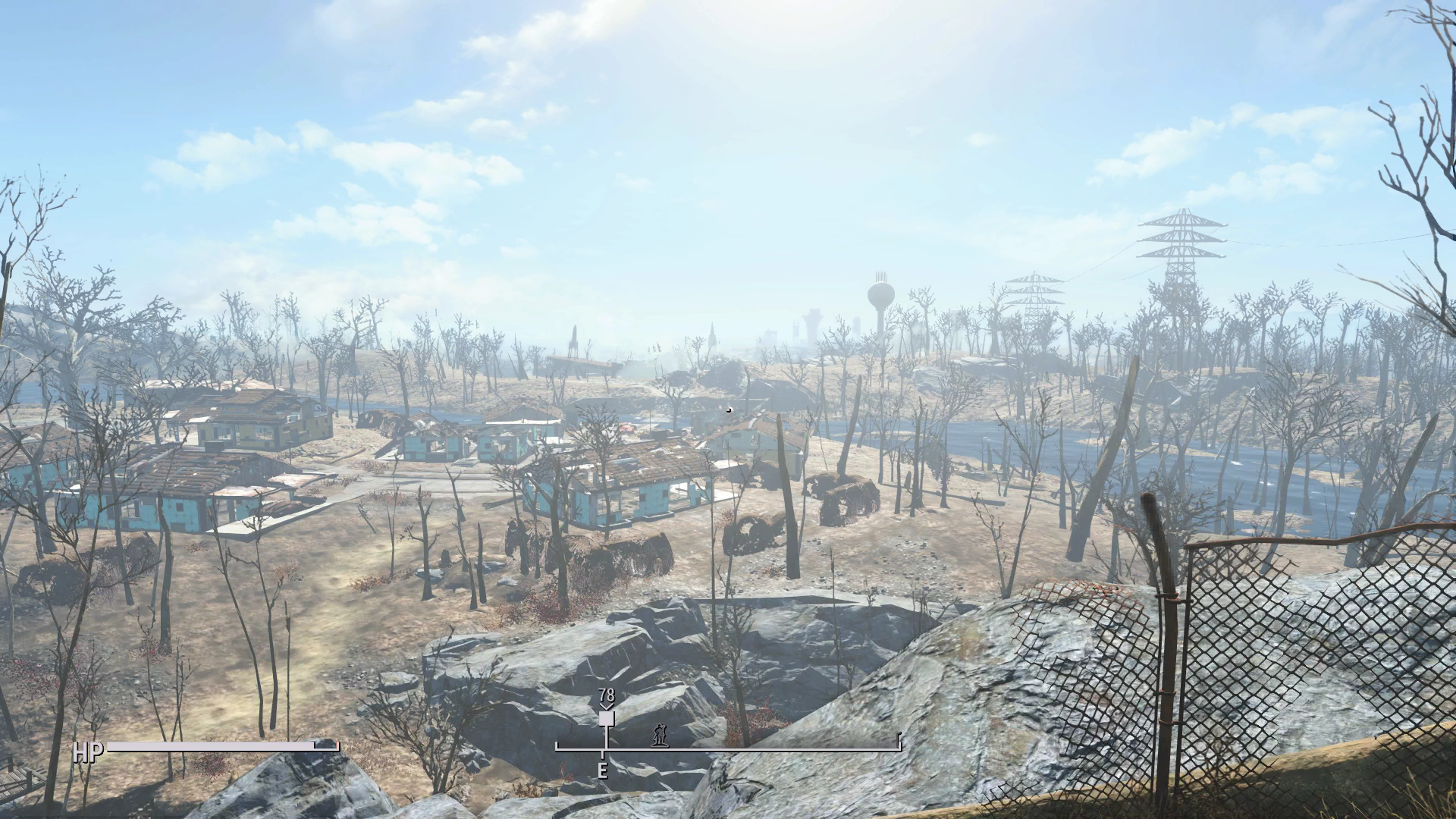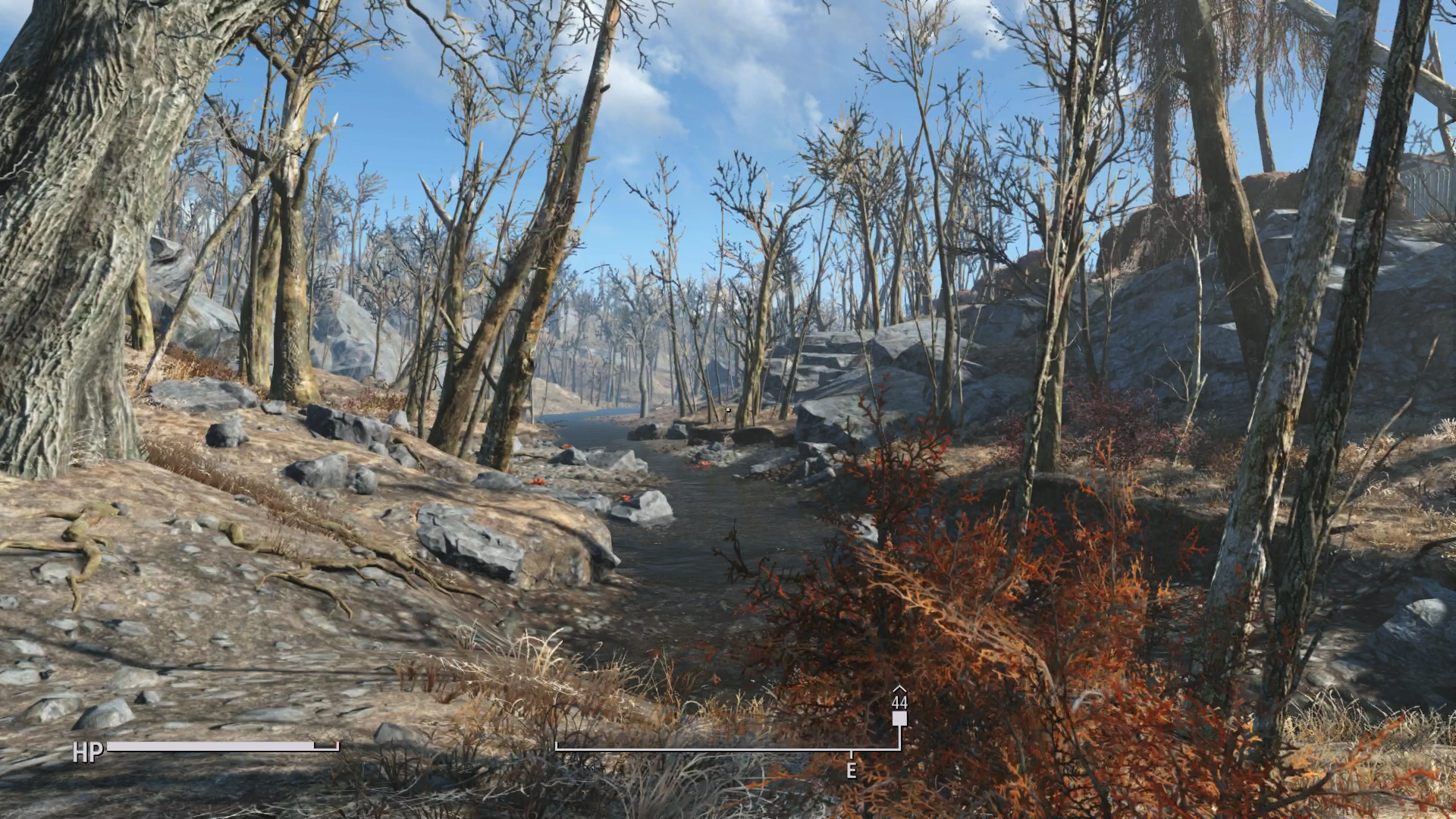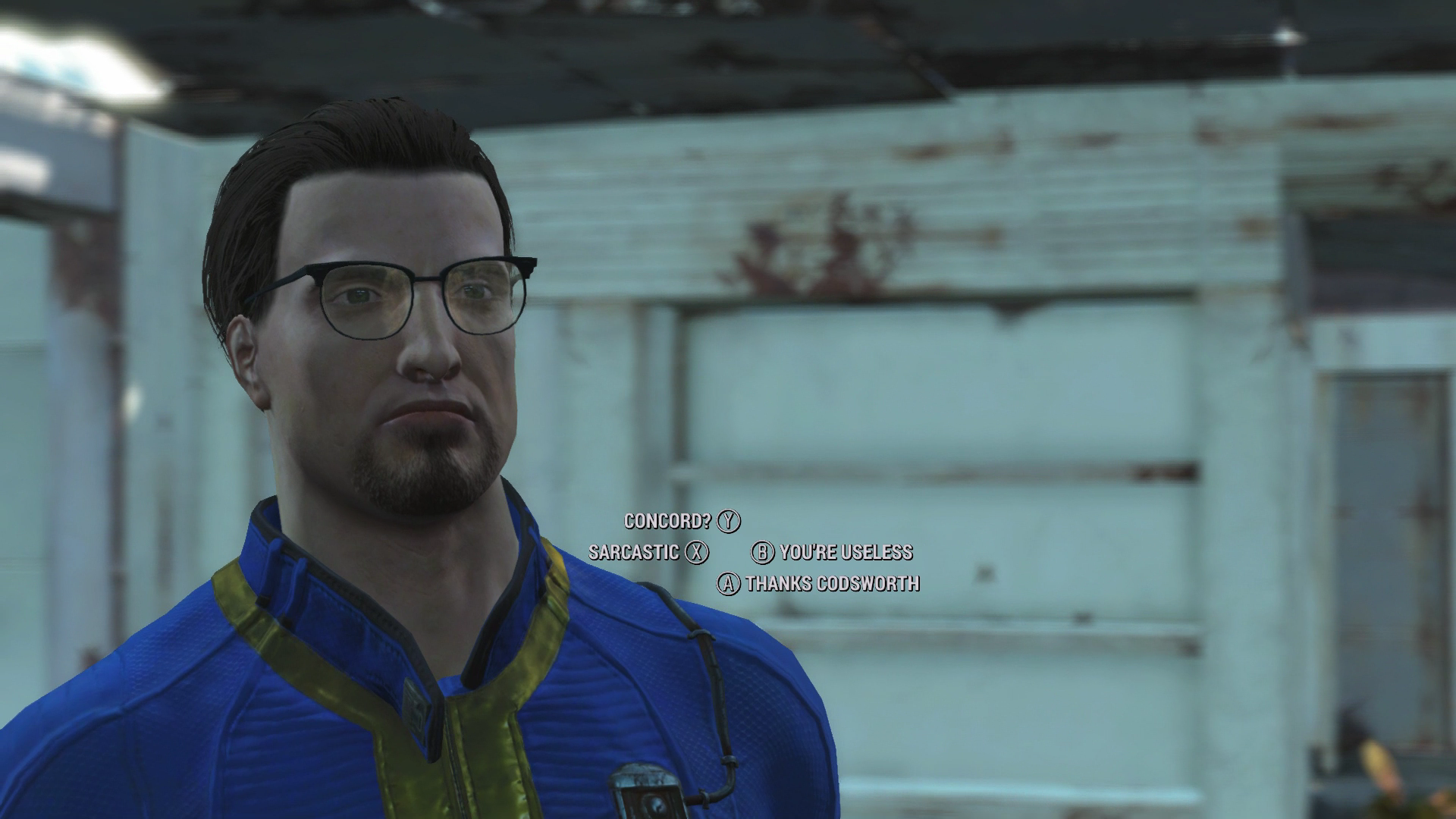To preface, it's worth mentioning that Fallout 3 is probably my favourite game on the Xbox 360. I knew that the mere mention of Fallout at Bethesda's E3 presentation would steal the show, and like millions of other gamers, I spent the last few months beside myself with anticipation for Fallout 4.
Set in a post-apocalyptic Boston wasteland, Fallout 4 is an FPS/RPG hybrid with a ridiculous amount of customization, gameplay options, quests and open-world scale. 2015 has been an incredible year for blockbuster titles, from Battlefront to The Witcher 3 and Halo 5 - Fallout 4 seemed poised to overshadow them all, but does it deserve to?
As a huge fan of Fallout, and Bethesda's particular brand of open-world RPG, I find myself with mixed feelings about Fallout 4.
Disclosure: This review was conducted on Xbox One using a copy provided by Bethesda.
Post-apocalypse
What is Fallout?
As mentioned, Fallout 4 is a role-playing game with heavy first-person shooter elements, set in a post-apocalyptic future. At the beginning of the game, you escape from a nuclear blast into one of the franchise's signature vaults - purpose built fallout shelters constructed by Vault-Tec. After being cryogenically frozen, you emerge from the Vault over 200 years later to discover a Boston completely flattened by nuclear war, littered with violent raiders, radioactive mutants and struggling survivors.
The Fallout series began life as an isometric RPG back in the 90s and was lauded for its open-endedness and player freedom. In typical WRPG fashion, you engage in quests, make story-altering decisions and design your character's stats and gameplay style. Bethesda - famed for The Elder Scrolls RPG series - picked up the franchise from Interplay Entertainment. Bethesda's first foray with the franchise was Fallout 3, back on the Xbox 360 and PC. Fallout 3 continued the spirit of the series atop the Gamebryo engine, used for Bethesda's smash-hit RPG Oblivion. Fallout 4 uses a newer version of Bethesda's in-house Creation Engine, based on Gamebyro and originally built for Skyrim.
All the latest news, reviews, and guides for Windows and Xbox diehards.
Fallout 4 promised to improve on the first person shooter elements introduced in Fallout 3, while delivering a familiar and epic 100+ hour nuclear survival role-playing fantasy.
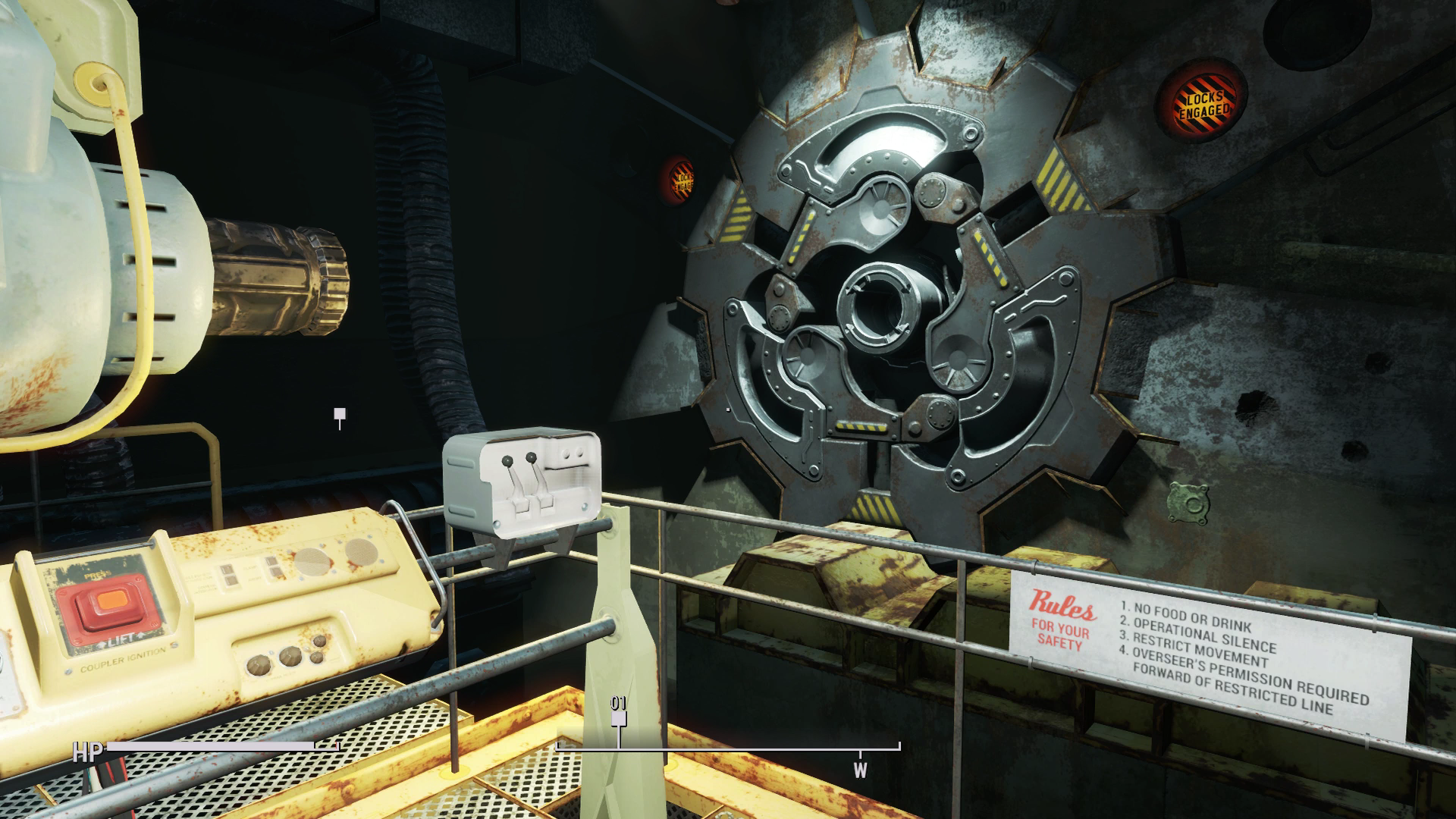
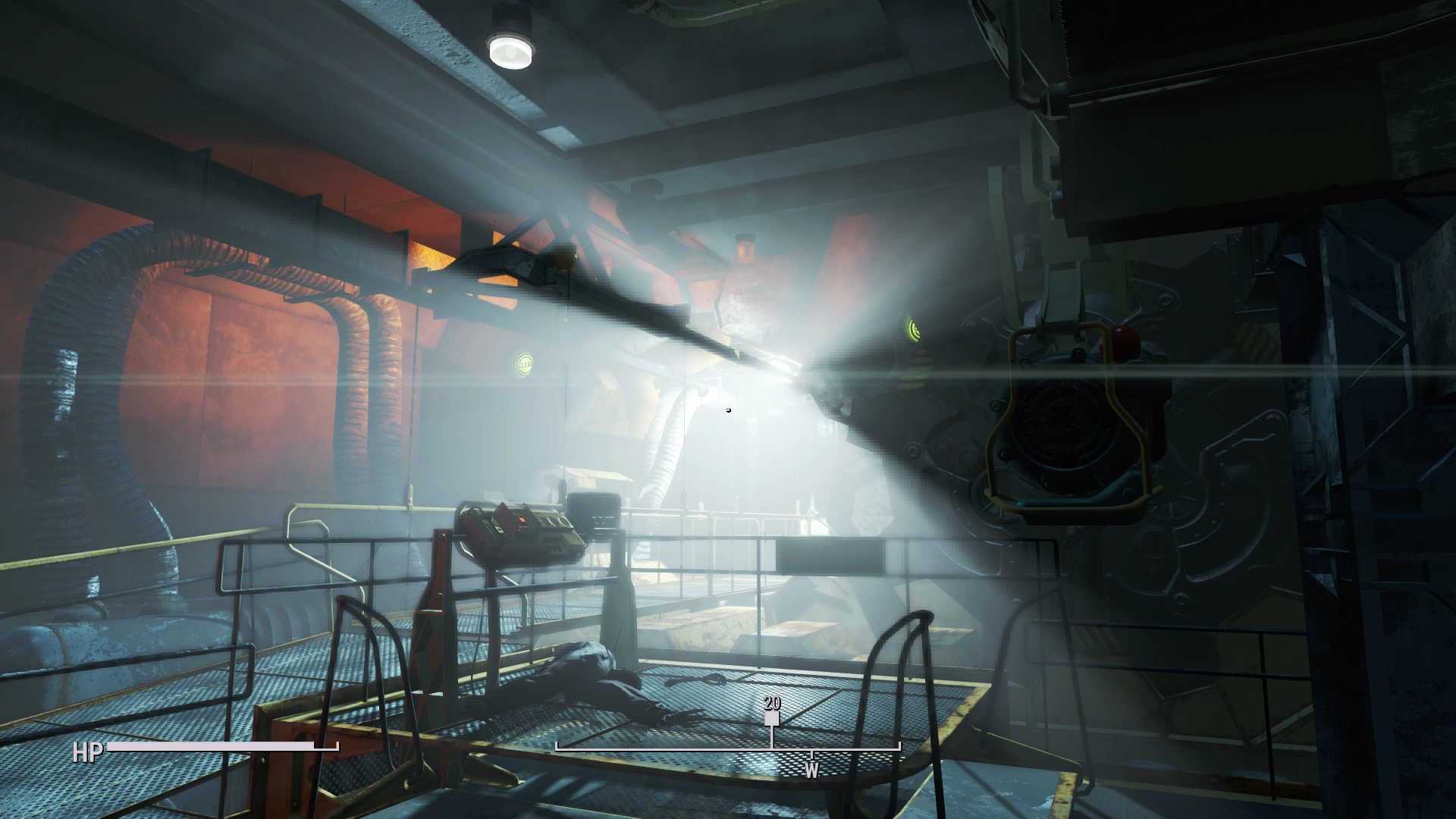
Finding vibrancy in decay
Setting and Presentation
There was some dissent about Fallout 4's visuals after its initial reveal. Despite being a new-gen only title, there have been a fair few comments about the graphics looking dated. Frankly, I think there's some fair criticism to be made, but at the same time, a game as vast as Fallout 4 is likely to have the odd muddy texture or poorly detailed object. After all, you can interact with most objects in some way, whether they're kitchen utensils, containers or the visceral debris from an exploded skull, all are fully-realized objects in Fallout 4 (like Fallout 3, Oblivion and Skyrim before it). As a result, few games are as immersive as Bethesda-brand RPGs, which speak to the game's instant popularity.
While I'd say The Witcher 3 would destroy Fallout 4 in a contest based on pure visuals, The Witcher 3's environs are completely static, more akin to a movie set. Fallout 4's visuals take a hit because of the sheer complexity and density of fully interactive 3D objects each area is crammed with; I'm sure Bethesda could reach higher if they wanted to, but therein lies the trade-off. It depends on whether you'd prefer a prettier game or a more interactive one.
Still, this isn't to say Fallout 4 looks bad, not by any means. Bethesda manages to inject some impressive nuclear majesty into the Commonwealth wasteland, by way of gorgeous lighting effects, dynamic weather and some industry-leading art direction. Fallout 4's audio enjoys similar love. The Pip-Boy radio features some fan favourites from Fallout 3 and New Vegas, in addition to dozens of fresh tracks to complement the series' retro-futurism. However, I tend to turn Fallout 4's radio off and enjoy the grim melancholy of the wasteland's immersive bespoke soundtrack.
Bethesda manages to inject some impressive nuclear majesty into the Commonwealth wasteland
Speaking of immersion, Fallout 4 has some of the most intricately detailed weapons and enemies I've seen - the art team at Bethesda HQ have thoroughly outdone themselves. There's an unbeatable level of authenticity in the game's makeshift, improvised weaponry. Even the most outlandish guns like the trash-blasting Junk Jet or various futuristic laser weapons could be believable real-world prototypes, albeit reproduced in 3D.
Bethesda's impressive attention to detail extends to the game's electric cast of characters and creatures. The nightmarish Synth enemies are particularly impressive, with painstakingly detailed cybernetic innards that, again, represent Bethesda's penchant for authenticity.
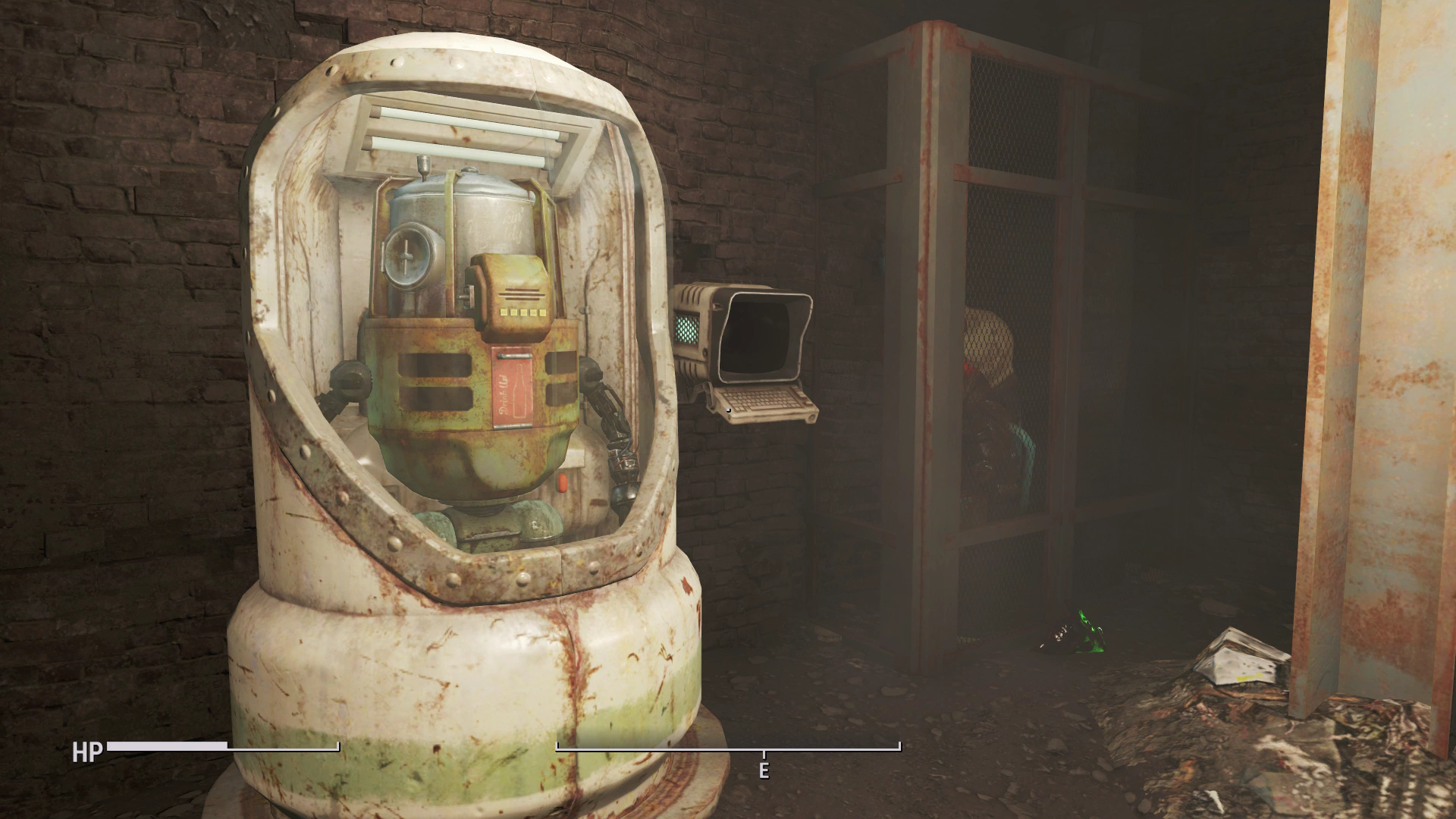
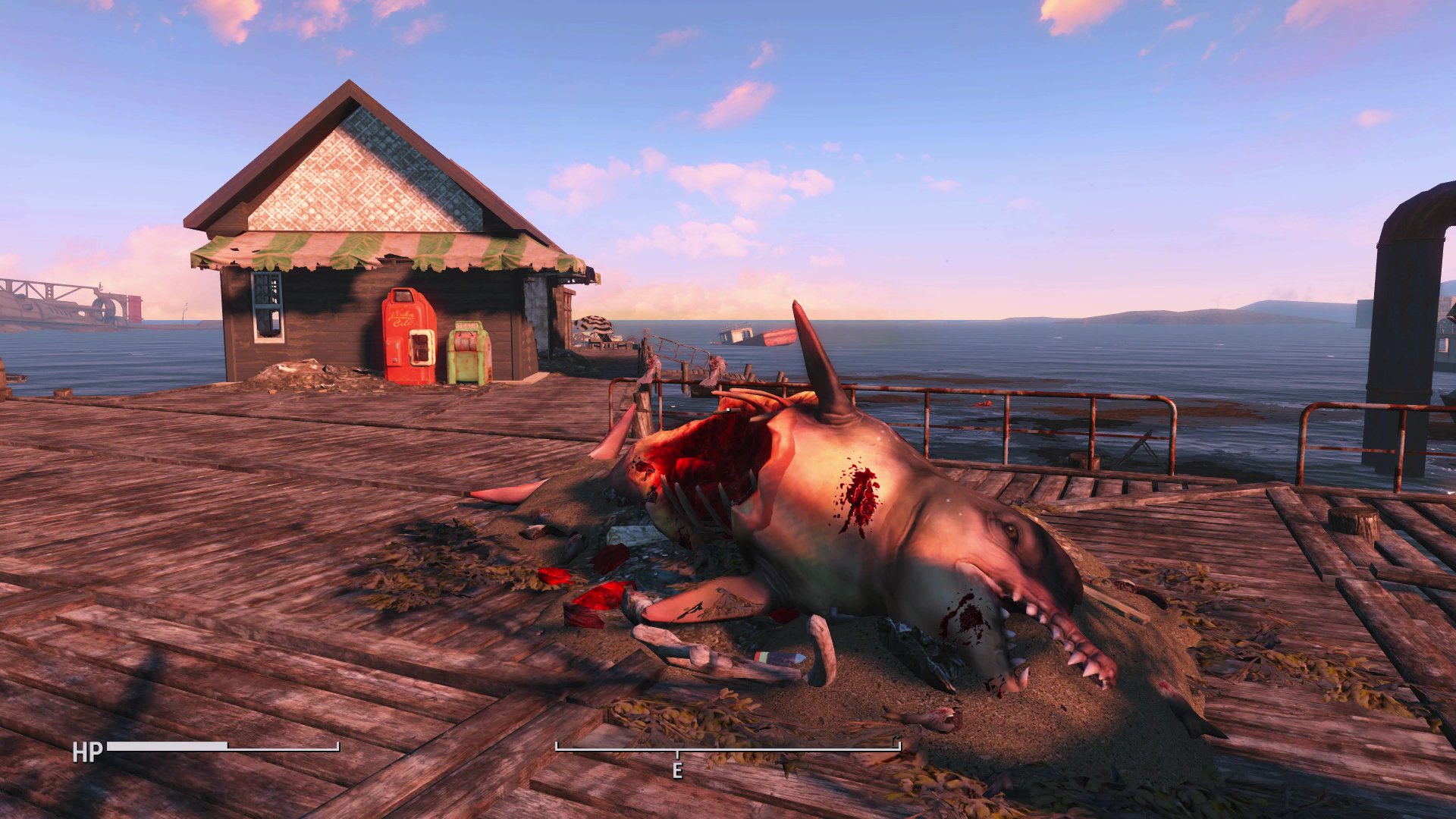
Fallout 4 takes a page from Bioware's book, granting the main character a voice and improving the cinematic feel conversations have by way of dynamic camera angles. I'll discuss the effect a voiced protagonist has in the story section of this review, but the new camera grant Fallout 4 a bit of much-needed modernization. You'll feel more sympathetic towards the game's characters, which are not only more visually expressive than in previous Bethesda RPGs but more memorable.
Bethesda is notorious for overly complex, overly huge games - which has, in the past, resulted in gratuitous amounts of bugs. At least, where presentation is concerned, I haven't encountered anything particularly damning. NPCs still behave in the same robotic way, ignoring obstacles and other characters as they wander around aimlessly, often into walls, shattering immersion in the process. Some of the game's more dense areas, like downtown Boston, can suffer frame rate drops down into the teens on Xbox One - but across almost 100 hours play, I haven't experienced a single crash or graphical anomaly.
Based on the setting alone, Fallout 4 is among the most immersive games available today. Thankfully, Fallout 4's gameplay does nothing but compliment the experience.
Vibrant and immersive
Gameplay
Fallout 3 injected some first and third person shooting into the franchise, taking the place of the isometric turn-based systems found in Fallout 1 and 2. Instead of ditching RPG combat entirely, Bethesda adapted the V.A.T.S. (Vault-Tec Assisted Target System) into Fallout 3, allowing players to spend action points to auto-target different body parts, often with cinematic and gory consequences.
Fallout 4 retains V.A.T.S, and they work in the same way to Fallout 3, producing satisfying cascades of bloody chunks for critical hits, and helping you dispatch enemies quickly in a pinch. There was little need to evolve this aspect of Fallout's combat, as such, Bethesda poured most of their efforts into the gunplay itself.
When describing Fallout 4, game director Todd Howard said that their studio enlisted id Software (Doom, Rage) to improve the shooting gameplay. The benefits are pretty clear. Almost every gun in Fallout 4 sports modern iron-sights aiming and hit markers. They can also be customized with dozens of different scopes, clips, stocks and other attachments. The crafting system is so extensive that, with the correct materials, you can turn certain pistols into rifles and vice versa. Unless you opt for a melee-heavy build (which enjoys similar crafting options), you'll be doing a lot of shooting. Thankfully, all those crafted weapons you've invested in are a pleasure to wield - even those built from wood and rusted metal.
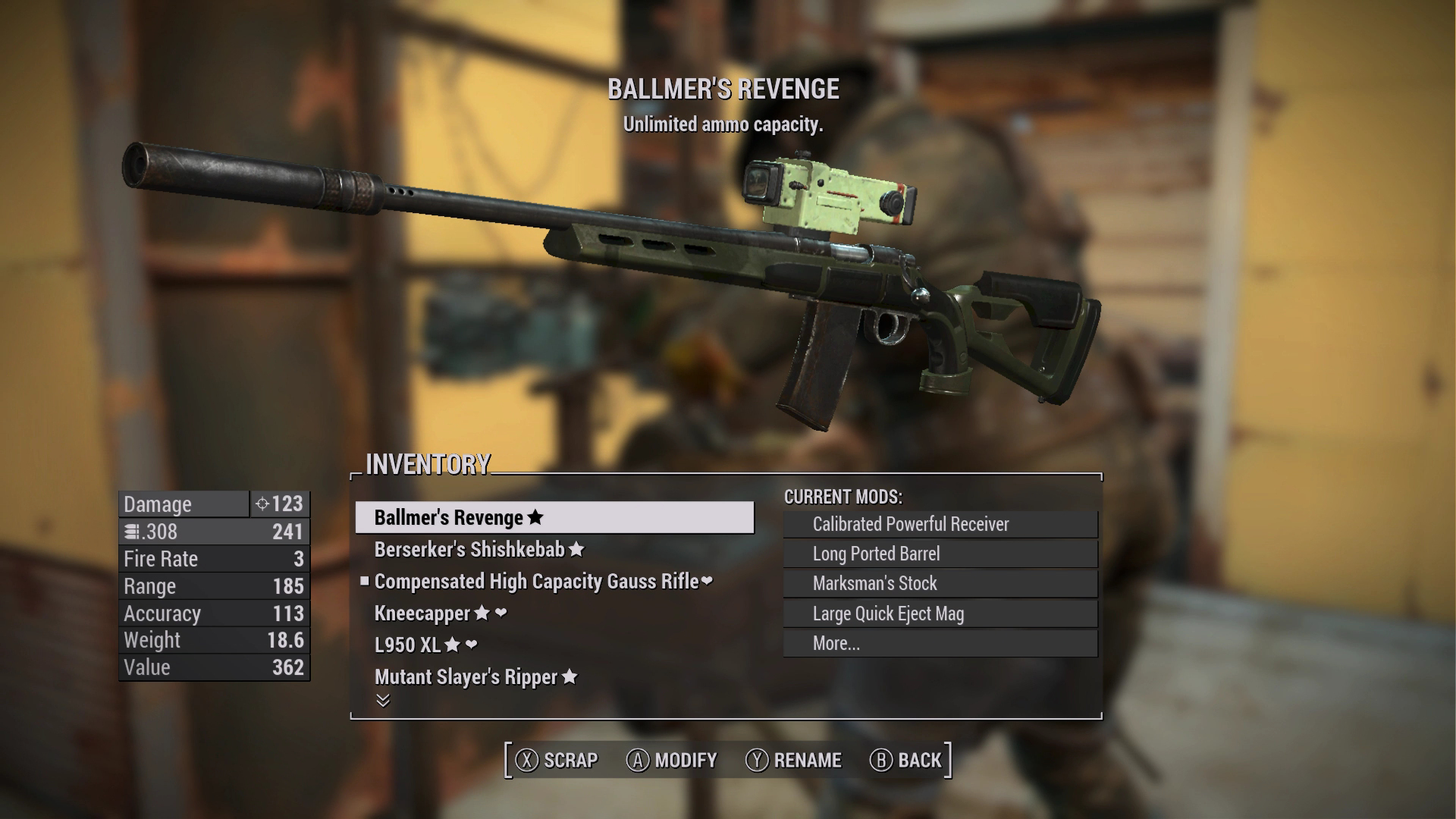
Scoped weapons can be steadied by holding your breath with the left stick, and even the weakest pea-shooters feel distinct and solid. The sheer variety of available weapons is staggering as well. There are several types of melee weapons, pistols, shotguns, rifles, explosives, energy weapons and heavy weapons - complete with the occasional unique weapon like the freezing Cryolator. You'll be hard pressed to find Fallout 4's combat repetitive, as it's very simple to change your playstyle on the fly.
Improvements to aiming aside, enemies aren't total bullet sponges this time around. Even on the higher difficulty settings, well-placed headshots will deal tremendous damage, often killing weaker enemies outright. That's not to say Fallout 4 is without challenge, however. The game frequently throws more powerful enemy variants at you to keep things interesting. When you play on the higher difficulties (and you should as you get more powerful), you'll encounter Legendary enemy types that drop unique, randomly generated items. I'm currently rocking a shoulder pad that grants me +2 luck, and a rifle that has infinite ammo. It adds an element of loot addiction, but some of the wackier weapon modifiers don't make a whole lot of sense in the context of the game's world.
You'll be hard pressed to find Fallout 4's combat repetitive.
Fallout's progression systems have received some tweaks for this entry too. Performing actions such as killing enemies, lock picking, hacking, and even building structures (more on that in a moment) will yield EXP. When you level up, you're able to spend a point to either increase one of your core stats, or receive a gameplay-modifying perk. For my first play-through, I tried to build a stealthy sniper with high agility and perception, while dumping points into perks that improve rifle abilities. You could create a character that specialises in melee combat, using heavy weapons like rocket launchers or even a wild west-style gunslinger. In typical Bethesda fashion, the studio leaves it entirely up to you how you will traverse the wasteland, and the variety only enhances the game's replay value.
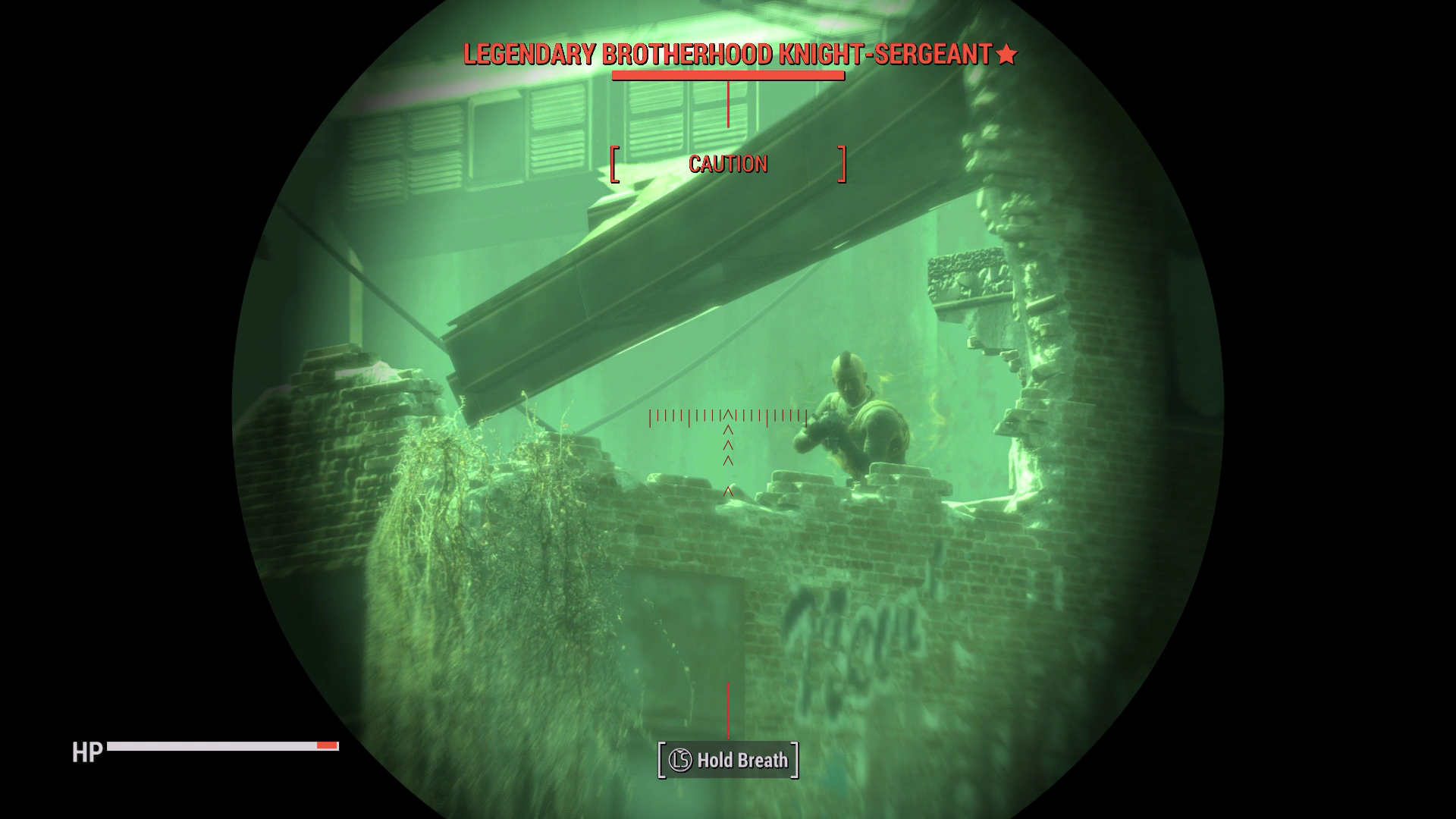
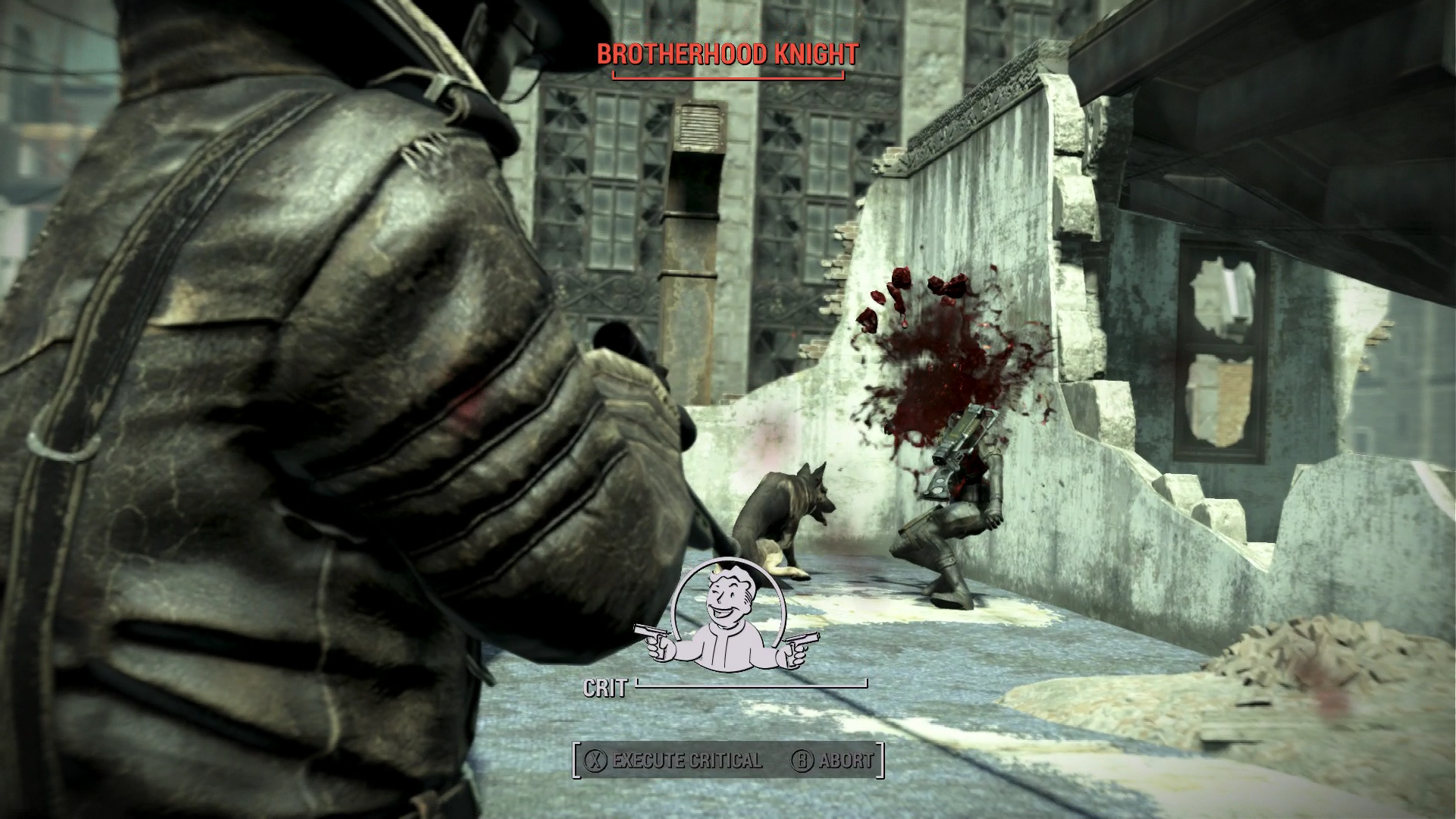
If all this wasn't enough, Fallout 4 introduces optional settlement construction, using the systems already present in the game's engine. Scrapping all those random object's in Fallout 4's sizable world will grant materials that you can use to construct buildings, forts, farms, and even defensive turrets and power grids. Your settlements will need sufficient stores of food, electricity and facilities like beds. They can also be attacked by encroaching raiders and mutants, so be sure to set up proper defences.
While the addition of settlement building is welcomed, the systems governing their gameplay are far from polished. Managing settlers and their job roles is an absolute pain, particularly as you can only see what jobs they're currently assigned to if you have a line of sight with the assigned work stations. Each settlement also has pretty restrictive build limits, which can be a tad frustrating - particularly if you want to construct defensive walls. The structural objects themselves can be difficult to manipulate as the engine won't allow you to clip into other objects even slightly. Using the Windows version's console commands can make these systems a little more intuitive, but if you're on Xbox or PS4, you won't have that option.
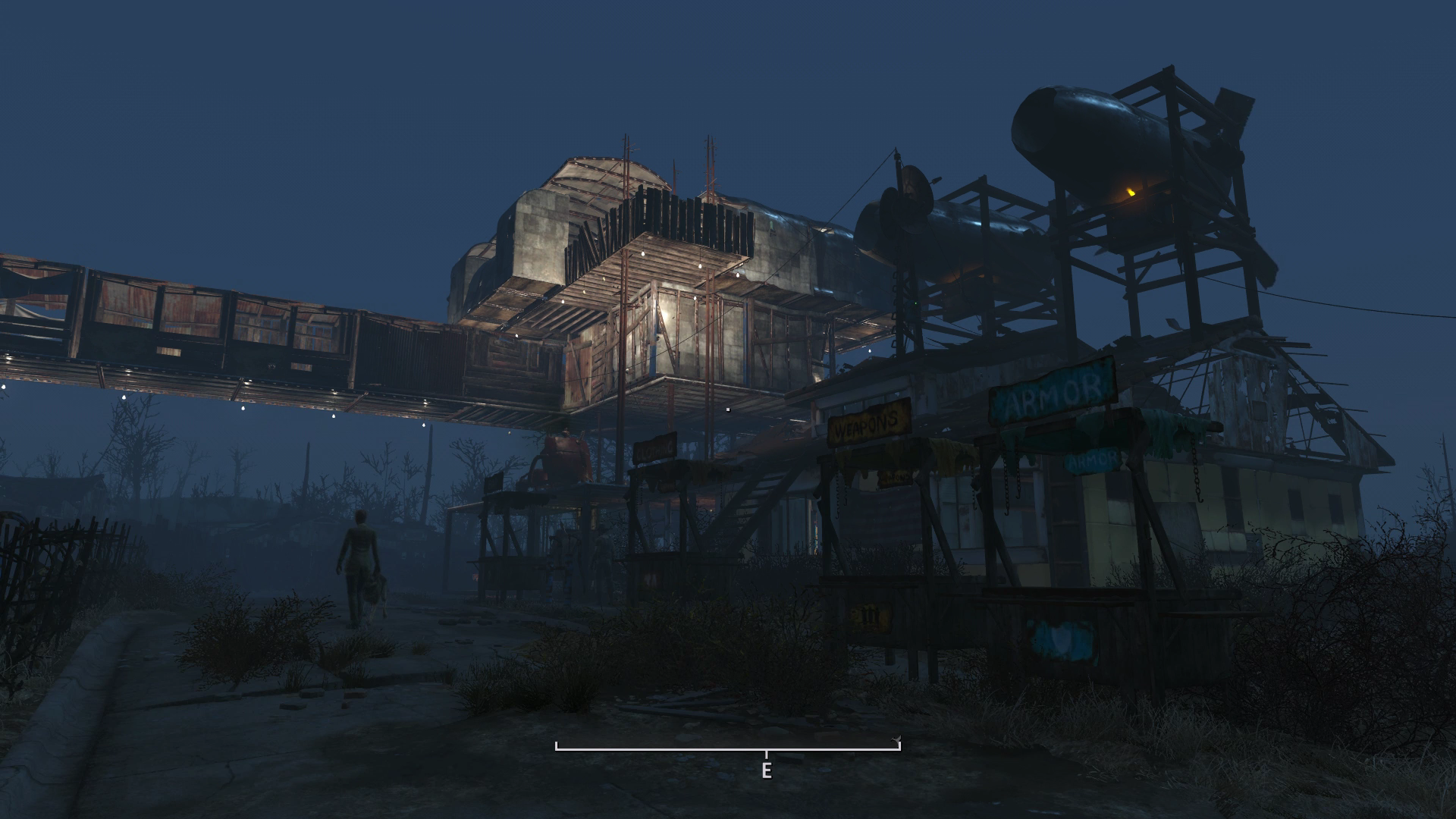
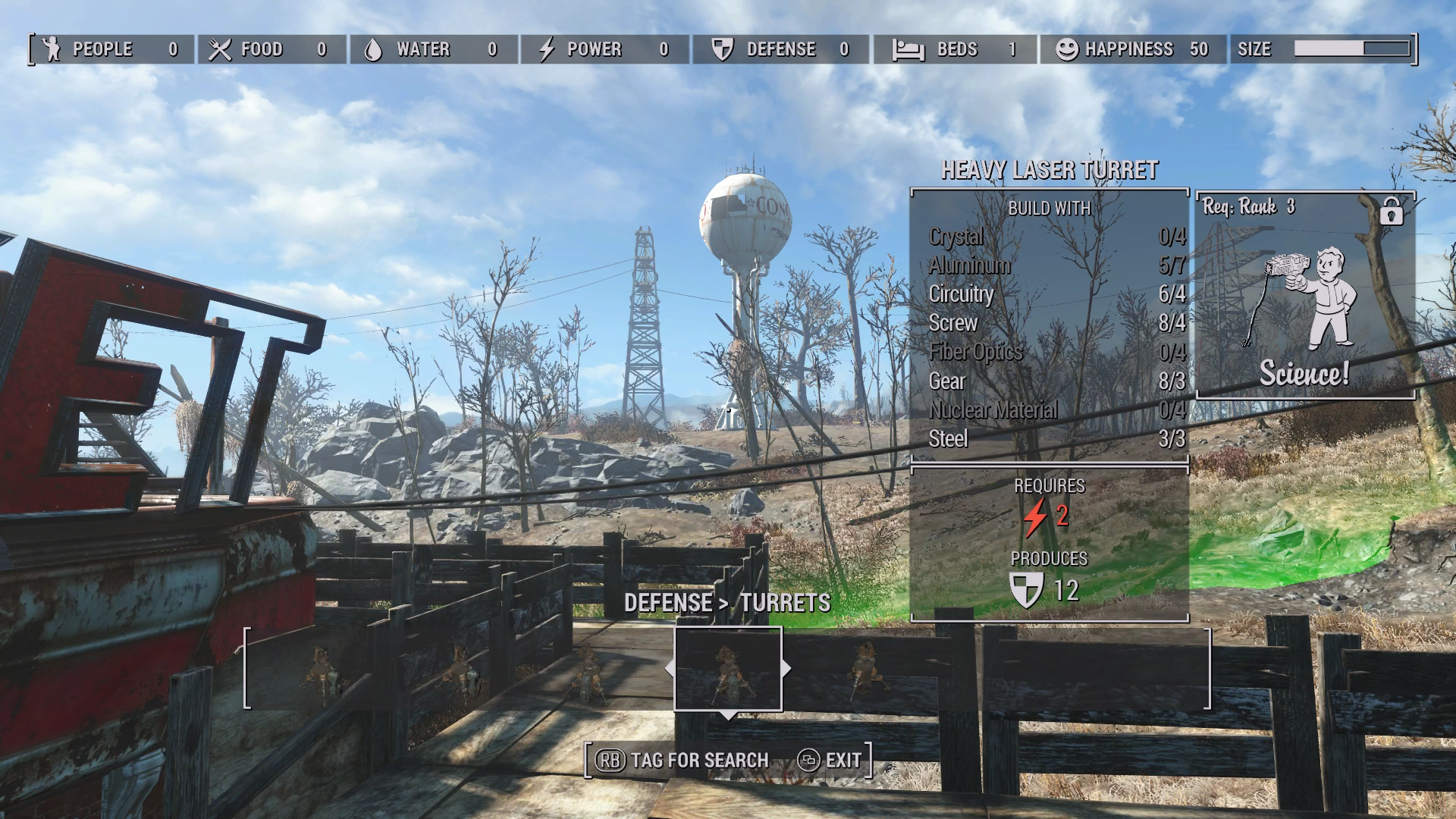
Despite the issues with these systems, I must've spent well over 30 hours building bases. The best way to describe it is Mad Max meets Minecraft, and with a little more polish, the base building side-system could probably ship as a standalone, post-apocalyptic Sims competitor.
There's plenty to praise about Fallout 4's gameplay, and the game in general, but there are also a few aspects I've found a little disappointing.
Trading freedom for focus
Story
As mentioned earlier, Fallout 4 introduces a voiced protagonist - this fact has two primary consequences. Firstly, I think granting the main character a voice decreases the sense that it's your story when compared to previous Fallout titles. It also makes the game's story a little more cinematic, particularly with improved camera angles in dialogue sequences. Bethesda seemingly ignored criticisms from previous Bioware titles that use a dialogue wheel. It gives you an idea of what your character will say, but this frequently leads to frustration as the full sentence doesn't always seem to match the shortened hint. Although, it doesn't really matter either way, as your dialogue choices rarely have consequences.
Without giving away too much to those who haven't played, you play as a Vault dweller who was somehow able to survive the nuclear holocaust that ruined the franchise's world. Much of the main story revolves around searching for a missing family member and unravelling the mystery of disappearing Commonwealth citizens. Bethesda games are rarely held up as an example of perfect video game writing (and indeed, Fallout 4 plays loose with the franchise's lore), but I think some of the characters and writing the game introduces represent a step up for the studio. Despite this, Bethesda seems to struggle to create a story that provides a sense of choice.
There's very little branching narrative to be found in Fallout 4. The game's conversation choices typically contain four options of vocalised dialogue. One usually represents a sarcastic response, one a blunt, to-the-point response, one a more considerate response, and another which is usually an inquiry for more information. Sadly, the opportunity to change the outcome of a quest using these choices is rare, even with high charisma scores. Most of the time, characters will ignore your protests and suggestions until you choose the "correct" dialogue option to progress the game's entertaining, but straightforward quests.
You're simply not given many opportunities to stray from a predefined story role.
There are a few key decisions you'll make which influence the game's plot and ending, but across the 100+ hours I've spent with the game, it's been quite rare to find decisions that affect the outcomes of side or main quests. Mostly, quests railroad you into following a strict path, which is quite jarring after playing previous Fallout titles, and indeed the recent Xbox version of Wasteland 2: Director's Cut - which shares its video game ancestry with Fallout.
Despite having tons of control over your appearance and gameplay style, your character's personality will mostly amount to "good guy", "sarcastic good guy," or "reluctant good guy", which I find to be an unwelcome departure for the franchise's storytelling. I would've liked the option to create a settler network with Raiders instead of the charity-obsessed Minutemen, or the ability to sell out certain annoying companions to their enemies. You're simply not given many opportunities to stray from a predefined story role.
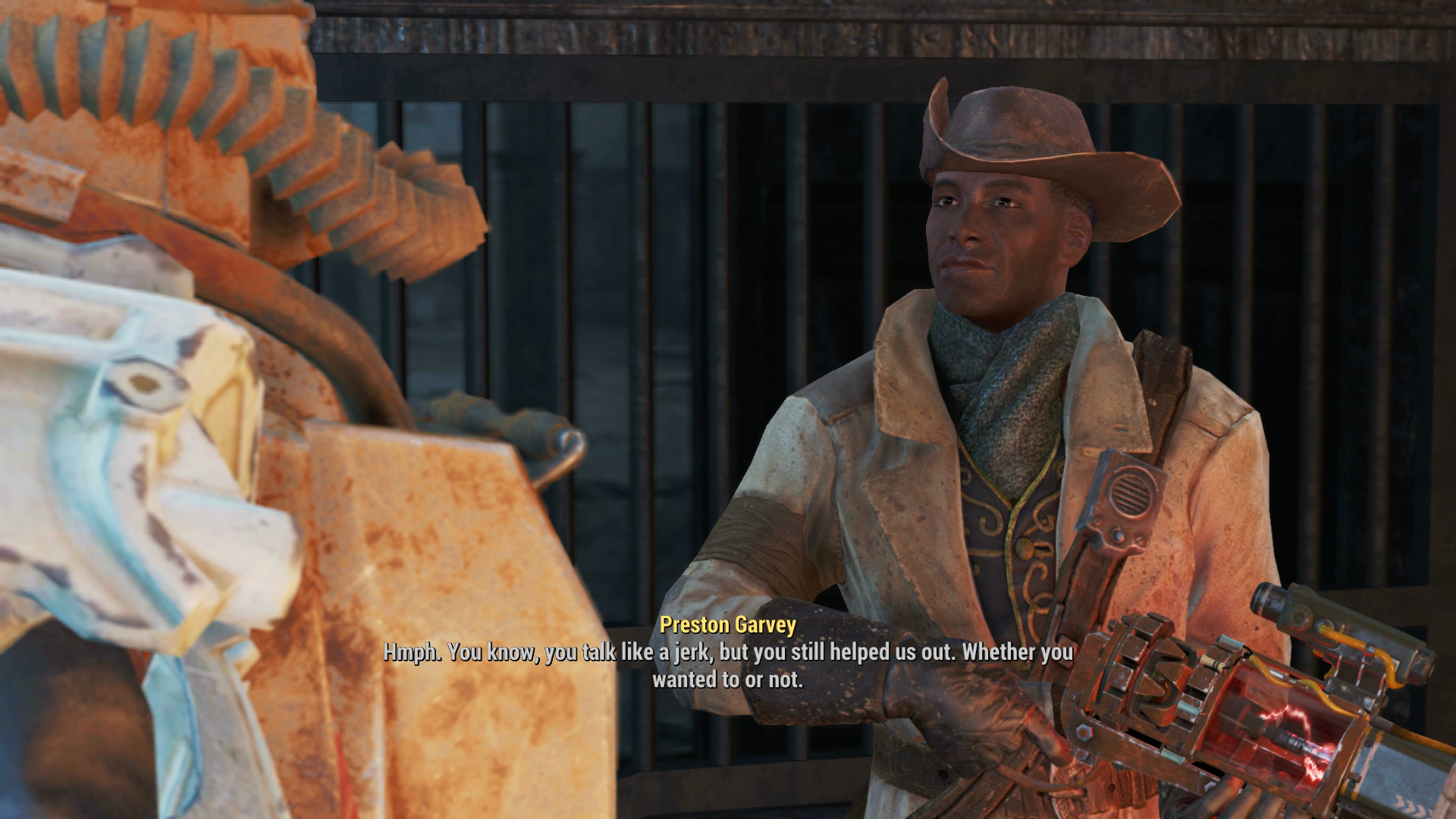
Like previous games, Fallout 4 has factions, often with wildly conflicting goals. You're able to join these groups, and you're freely able to complete their quests and work against competing factions up to a specific point. When you do reach that point, Bethesda informs you that you're about to alienate other factions with a hand-holding tooltip. Beyond aligning yourself against certain groups at this specific plot point (each of which represents a moral grey area), I've found little consequence for your actions in Fallout 4.
Thankfully, the game's quests and storylines are engaging enough without the breadth of freedom previous titles have provided, but I feel it's a point worth noting - particularly if you're well invested in the series as a whole. Unlike previous Fallout titles, Fallout 4's quests compete with the player's will for attention. Some may welcome the more focused and cinematic storytelling, but Bethesda sacrifices some roleplaying freedoms to achieve it.
An incredible game, an average RPG
Conclusion
Fallout 4 is already a runaway success story, shipping millions of copies. Despite my disappointments with the capacity for roleplaying, I adore Fallout 4 and eagerly anticipate the DLC, season pass in hand.
Fallout 4 represents incredible value for money, granting the player tons of things to do across potentially hundreds of hours of play. The shooting mechanics have become refined, taking a place among this generation's FPS-first heavy hitters. The crafting systems are laudable, and the base building system is utterly addictive.
Pros:
- Vastly improved combat mechanics
- Well over a hundred hours of gameplay
- Settlement construction is a welcome addition
Cons:
- Shallow dialogue choices
- Engine quirks from Skyrim and Fallout 3 haven't been addressed
- This game will take over your life
Fallout 4 is a story of trade-offs. Bethesda trade cutting-edge visuals for interactive density, they trade roleplaying freedom for a story that's a little more focussed and cinematic, and they ditch some of the franchise's intricacies to broaden its appeal. Fallout 4 is an incredible open-world shooter, but I'm concerned that the series is beginning to stray from its roleplaying roots.
With that in mind, I'm off to start my third character.

Jez Corden is the Executive Editor at Windows Central, focusing primarily on all things Xbox and gaming. Jez is known for breaking exclusive news and analysis as relates to the Microsoft ecosystem while being powered by tea. Follow on Twitter (X) and tune in to the XB2 Podcast, all about, you guessed it, Xbox!
